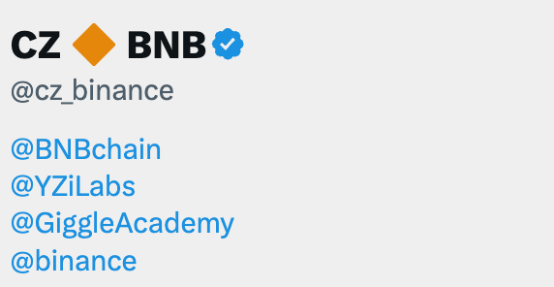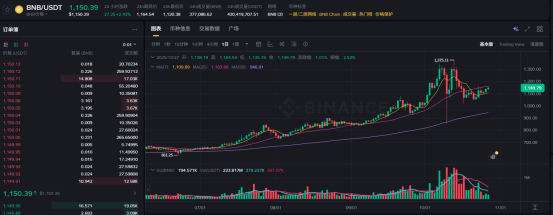撰文:陀螺财经
上周,一则消息,引发了行业轰动。
10 月 22 日,特朗普总统突然在白宫签署对 CZ 的特赦令,并于次日向公众进行了披露。白宫新闻秘书卡罗琳·莱维特发布声明表示:「总统行使宪法赋予的权力,赦免了在拜登政府针对加密货币的战争中被起诉的 CZ 先生。拜登政府对加密货币的战争已经结束。」
虽然早在今年 3 月就有消息传出赵长鹏正在申请特赦,但如今消息尘埃落定,还是激起了市场的热烈反应。随着堪称华语币圈第一人的特赦,BNB 应声上涨,BTC、ETH 也罕见联动升温,币安重回美国的论调再度抬头。
从缴纳巨额罚金锒铛入狱再到如今特赦成为多国总统的座上宾,赵长鹏这一曲折的经历,让币圈,又多了一个传奇故事。
时间拉回到 2023 年 11 月,币安与美国司法部(DOJ)、商品期货交易委员会(CTFC)、外国资产控制办公室(OFAC)和金融犯罪执行网络(FinCEN)就币安历史注册、合规和制裁问题的调查达成了解决方案。
赵长鹏最终承认违反《银行保密法》、《国际紧急经济权力法》以及《商品交易法》等行为开展无证转账业务、共谋指控以及违禁交易,并以 43.68 亿美元的天价罚金交付了自由买路钱,也创下了 FinCEN 有史以来最大罚款记录。
在当时,市场论调多是认为赵长鹏作为全球最大交易所的华人执掌人,受到了政治迫害。迫害的确有迹可循,赵长鹏的最初预计刑期为 18 个月,而后一度被司法部欲至 3 年,但随后在主动认罪与激荡的舆情论调下,最终于 2024 年 4 月,西雅图联邦法院判处赵长鹏 4 个月监禁。据赵长鹏回忆,在入狱当日,其曾经历了相当羞辱性的搜身,第一个室友甚至是双重杀人犯,这一段牢狱生活,也被其称为「人生最难熬的时刻」。
2024 年 9 月,赵长鹏刑满出狱。但显然,这段牢狱经历,带给赵长鹏的,远远不止痛苦这般简单,更深层次的,是让其意识到加密无国界,但法律不是,即便是加密行业也要学会在政治的夹缝中生存。同时,作为加密最大交易平台的掌舵人,对于美国而言,华人这一身份似乎也相当微妙,其中既有政治意味的隐喻,也有永远摆脱不掉「非我族类」的深刻烙印,即便从国籍角度,赵长鹏是彻头彻尾的加拿大人。在此背景下,找到一棵好乘凉的「大树」,就变得格外重要。
或许也正是由于此,9 月出狱后,赵长鹏频繁的前往阿联酋与香港,一反常态的与各大监管层开始会面,开始从头构建自身的政治身份。11 月大选后,随着特朗普的上台,加密换了新天地,而币安与赵长鹏,似乎也找到了机会。
2025 年 3 月,币安官宣获得阿布扎比主权基金 MGX 20 亿美元投资,20 亿美元获取 5% 的股份,以币安年过百亿美元的年收入而言,只能用「交个朋友」来形容。更微妙的是,这一笔 20 亿美元的交易结算金额是 USD1 ,恰好是特朗普家族项目 WLFI 推出的稳定币。不久后,赵长鹏在社媒发布与 WLFI 联合创始人 Zach Witkoff 的合影,两周后,USD1 正式上线 BNB Chain,得到了币安链上的广泛推广。
4 月,赵长鹏正式向特朗普政府提交了总统特赦申请。转折的信号在 9 月份到来,CZ 将 X 账号上的简介由「ex-@binance」 改成了「@binance」,市场对其回归猜测不断。资本们更是春江春暖鸭先知,10 月 22 日,美国本土合规交易平台 Coinbase 与 Robinhood 陆续放开 BNB 交易,主流金融不再谈币安色变,BNB 也顺利登陆至美国金融市场。

最终于今年 10 月 23 日,特朗普签署行政赦免令,撤销赵长鹏的刑事定罪。此处对特赦进行简单介绍,1787 年美国制宪会议,赋予了总统在特定情况下赦免罪犯或减刑的权力,被赦免者不再背负联邦刑事前科记录、刑罚限制可能终止或解除。这一权力在美国《宪法》第二条第二款中得到了确认,除弹劾案之外,总统有权对违反联邦法律者颁赐缓刑和特赦。因此从理论上,总统赦免权的适用范围相当之高,除了不能赦免被国会弹劾的对象外,只要是违反联邦层级法律的当事人都可获得赦免,截止到目前,特朗普签署了超过 40 次特赦令,涉及约 237 人,赵长鹏也是其中之一。
仅从行为的意义而言,由于赵长鹏此前已然结束刑罚且缴清罚款,特赦并无实际的刑罚减免,更不意味着可以将此前的罚款收回,这也决定了特赦的象征意义要远高于实际意义。通过特赦,赵长鹏的犯罪记录可以被抹去,回归清白的身家,可以更好地实现政治与资源舞台的向上攀登。在今年 9 月与财新的采访中,赵长鹏也提到将投入更多精力在创投机构 YZi Labs 上,并已经受邀担任多国政府的官方加密行业顾问,清白身显然可以让其可能的政治生涯走得更远。就在 3 日前,赵长鹏与吉尔吉斯斯坦总统 Sadyr Japarov 共同参加了国家区块链和加密委员会第二次现场会议。
另一方面,在此前的判决中,规定赵长鹏在刑满释放后 3 年内不得参与币安的管理或决策活动,而在这一期间,币安必须由独立合规官监督运营,该监督直接向美国司法部报告,换而言之,币安的一举一动都在美国司法部的眼皮底下。尽管合规监理难以被特赦免除,但第一条参与直接管理的限制有望被解除,赵长鹏将有望回到币安重新掌舵,事实上,鉴于当前币安的争议频发,市场对现任 CEO RichardTeng 的态度很难称之为友好。更进一步的,币安也有望重回美国,双向打开流动性之门,这将对现有美国加密交易所格局产生巨大影响。
对行业而言,「老大」的回归也是毋庸置疑的利好,不仅再度表明了特朗普对加密行业的支持态度,也为加密行业提振了信心。消息传出后,BNB 应声上涨 7%,回到 1100 美元上方,更是联动主流货币上扬,比特币回归 11 万美元,以太坊直奔 4000。连锁效应也快速发酵,一是币安上的 MEME 币集体短线上涨,此前在国庆中大放异彩的币安人生短时从 0.23 美元上涨至 0.28 美元,涨超 20%,二是以 BNB 作为财库的上市企业获取到了红利,BNB Network Company、Nano Labs 均所有涨幅。就连特朗普的 WLFI 也受益不浅,WLFI 成功站上 0.14 美元,WLFI 财库上市公司 ALT5 Sigma24 小时也涨超 13%。

当然,万事万物都无法做到所有人都开心,特朗普的反对派们对此就格外不满。回顾整个时间线,从与阿联酋频繁会面到阿布扎比投资,从 WLFI 联创合影到稳定币支持,从申请赦免到赦免成功,显然可看出一条赵长鹏与政治圈链接的草蛇灰线。用通俗的话语表示,正是搭上了特朗普的这一条大船,赵长鹏才能重归清白身。
有趣的是,特朗普对赦免的原因回应道,「我不认识他,但很多人说他无罪且被拜登政府迫害。」此言不知是否为明面避险的假意,即便是真,也只能说明赵长鹏与总统的周边人士相当亲近,而非与特朗普真的「毫不认识」。更巧合的是,就在特赦之后,特朗普在白宫发言时表示因为民主党导致的政府停摆带来的军饷缺口,他有一位「不愿说出姓名的好友且很棒的人」自掏腰包寄送了一张 1.3 亿美元的支票慷慨解囊,此举也让市场产生了这位好友或许是赵长鹏的流言,有人认为正是给出了政治献金,赵长鹏才得以获得特赦。
军饷真假难辨,但华尔街已成惯例的游说必定是真。知名的时政媒体 Politico 曾报道,根据游说企业 Checkmate Government Relations 披露,币安于 9 月底聘请了 特朗普长子小唐纳德·特朗普的好友 Ches McDowell,为其在白宫和财政部游说金融政策问题及「行政救济」事项,一个月支付金额为 45 万美元。加密货币律师 Teresa Goody Guillén 也显示今年从币安和赵长鹏处总计获得 29 万美元的游说费用。
实际上,以特朗普的商人特性就可了解,赵长鹏此番特赦,必然存在着大量的金钱与资源博弈。针对此点,政治对手们迅速展开了围绕特朗普的攻讦,认为特朗普无视法律法规,将特赦作为一场赤裸裸的利益交换。
据 AXIOS 报道,美国参议院民主党人正采取行动,正式谴责特朗普对赵长鹏的赦免决定。部分参议院共和党人已对此次赦免提出批评,而民主党人正试图借此促成两党罕见联手,共同表达对白宫决策的反对。民主党人对特朗普的攻击已非一日之寒,大概率本次也不会带来任何水花。
回到主题上,赵长鹏的合规之路,虽然暂告一段落,却还远远未见尾声,虽然在本届政府获得优待,但站队也隐含着巨大的风险,错综复杂的政治人生仅仅只是刚刚开始,而这,也是海外华人企业家不得不选择「左右逢源、长袖扇舞」的原因。
在获释后,赵长鹏迅速表达了对特朗普的感谢,表示「将竭尽全力帮助美国成为加密货币之都,并在全球范围内推进 Web3 的发展。」
言论的落脚点是美国,这意味着赵长鹏自己也清楚,无论何种回归,能得到最大利益的,必然也必须是美国。
免责声明:本文章仅代表作者个人观点,不代表本平台的立场和观点。本文章仅供信息分享,不构成对任何人的任何投资建议。用户与作者之间的任何争议,与本平台无关。如网页中刊载的文章或图片涉及侵权,请提供相关的权利证明和身份证明发送邮件到support@aicoin.com,本平台相关工作人员将会进行核查。




